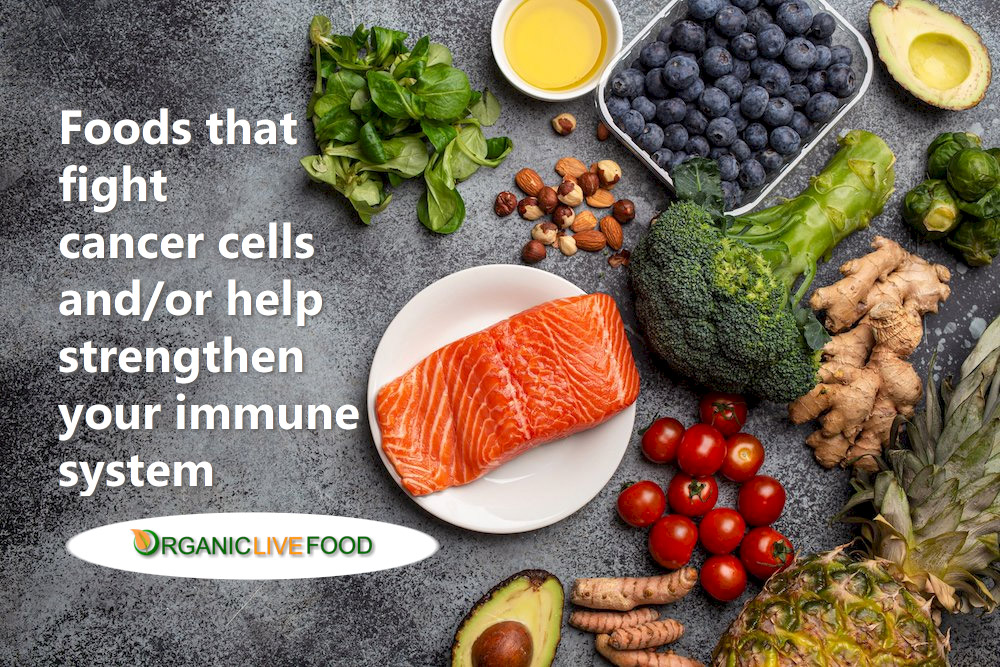Foods that can help to kill or feed cancer cells
- Posted/Updated: February 12th, 2026

For the past 2 decades, various research studies by public health authorities have shown that a diet filled with a variety of vegetables, fruits, whole grains, beans, and other plant foods can help lower the risk for many cancers.
Cruciferous vegetables like broccoli, cauliflower, cabbage, and leafy greens such as kale, arugula, and Swiss chard have been shown to provide impressive protective effects against several health conditions, including cancer.
They’re concentrated in sulfur-containing phytochemicals called glucosinolates.
Additionally, herbs like thyme and oregano possess an anti-cancer compound that suppresses tumor development.
Organically Grown, Fresh, Live, and Healthy Foods that kill cancer
Unsulfered and No Canned, Processed, Pickled, or Cooked
| Asparagus |
Apples |
Apricots |
Artichoke |
| Arugula |
Beets (red and white) |
Broccoli (super food) |
Horseradish |
| Cabbage |
Carrots |
Cauliflower |
Celery |
| Chard |
Cherries |
Chicory |
Chives |
| Cilantro |
Currants |
Eggplant |
Endives |
| Flax seeds + Flag oil |
Dried fruits |
Fresh fruits |
Garlic |
| Grapefruit |
Grapes |
Green beans |
Honey (raw + pure) |
| Freshly squeezed Juices |
Kale (super food) |
Kelp |
Leeks |
| Lettuce |
Mangoes |
Melons |
Oatmeal |
| Onions |
Oranges (1 per day) |
Parsley |
Peaches |
| Pears |
Peppers / Bell peppers |
Plums |
Potatoes |
| Radishes |
Rhubarb |
Romaine lettuce |
Spices |
| Spinach |
Squash |
Sweet Potatoes |
Swiss Chard |
| Tangerines |
Tomatoes |
Vinegar (cider ok also) |
Watercress |
| Yams |
Zucchini |
Turmeric |
Saffron |
Exceptions to above:
 Lemons, oranges, grapefruits, and tangerines should be limited to no more than 1 per day
Unsalted zero-fat Rye Bread can be consumed but limited to no more than 1 slice per day
Spices should be limited to small quantities (allspice, anise, bay leaves, Coriander, dill, fennel, mace, marjoram, rosemary, sage, saffron, tarragon, thyme, sorrel, summer savory)
Spinach can be steamed a little but not excessively heat-cooked but avoid raw spinach.
Tomatoes can be steamed a little but not excessively heat-cooked.
Quinoa can be consumed once a week.
Nuts and seeds (combined) should be limited to 5 grams per day.
Small amounts of mushroom can be consumed once a month.
Pre-soaked peaches, dates, figs, apricots, and raisins are allowed, but keep limited.
Avocados should be limited to once a week.
Coconut water should be limited to an ounce per day.
Berries should be limited to an ounce per day.
Cooked beans or cooked lentils should be limited to once a month.
Yams and potatoes should be limited to once a week.
Bananas should be limited to 1 per week.
Maple syrup (again only organic) should be limited to 1 teaspoon per day.
Check with your doctor to discuss the above foods and exceptions to make sure that are none of the items in the above list is harmful in your specific case.
Lemons, oranges, grapefruits, and tangerines should be limited to no more than 1 per day
Unsalted zero-fat Rye Bread can be consumed but limited to no more than 1 slice per day
Spices should be limited to small quantities (allspice, anise, bay leaves, Coriander, dill, fennel, mace, marjoram, rosemary, sage, saffron, tarragon, thyme, sorrel, summer savory)
Spinach can be steamed a little but not excessively heat-cooked but avoid raw spinach.
Tomatoes can be steamed a little but not excessively heat-cooked.
Quinoa can be consumed once a week.
Nuts and seeds (combined) should be limited to 5 grams per day.
Small amounts of mushroom can be consumed once a month.
Pre-soaked peaches, dates, figs, apricots, and raisins are allowed, but keep limited.
Avocados should be limited to once a week.
Coconut water should be limited to an ounce per day.
Berries should be limited to an ounce per day.
Cooked beans or cooked lentils should be limited to once a month.
Yams and potatoes should be limited to once a week.
Bananas should be limited to 1 per week.
Maple syrup (again only organic) should be limited to 1 teaspoon per day.
Check with your doctor to discuss the above foods and exceptions to make sure that are none of the items in the above list is harmful in your specific case.
Must Avoid:
Dairy (yogurt, milk, cheese, cream, butter, ice cream, etc.)
White rice and brown rice (arsenic is found in rice, even organic brown rice)
No alcohol
No Animal fat
No oils (except small amounts of Flax oil)
No seafood
No protein powders or protein shakes
Coffee
Sodas (all) and all commercial beverages and energy drinks
Salt, sea salt, table sale and processed sodium
Baking sodas
Frozen foods
Hydrogenated or partially hydrogenated oils
All oil substitutes
All sugar substitutes or sweetners
White flour
White sugar and brown sugar
All red meats
Pizzas
Manufactured or processed foods
Mustard
Seafood (exception of small quantities of wild Salmon)
All soy products
No pineapples
No soy sauce

